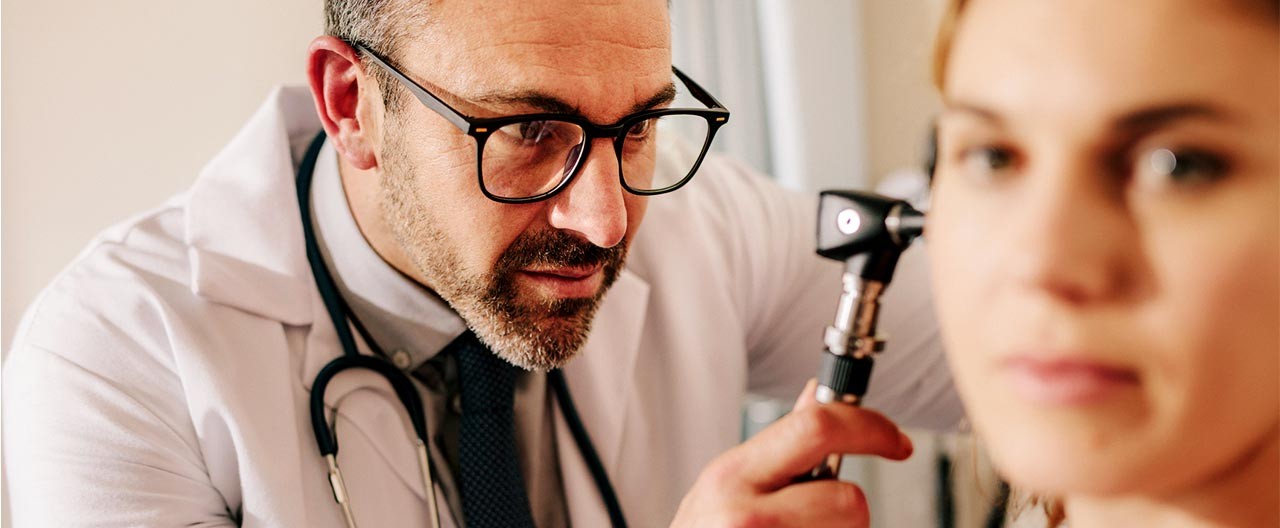Understanding and preventing hearing loss in the workplace

Chubb HealthBeat
Chubb’s Claims department includes a team of dedicated registered nurse professionals with extensive experience helping businesses and organizations address health and safety issues. Our nursing team also supports employees as they recover from injury and illness — and return to work. In the spirit of promoting safe and healthy workplaces, our medical specialists developed this edition of Chubb HealthBeat to help your business and employees understand and prevent hearing loss.
The scope of hearing loss and its causes
In the U.S., hearing loss in adults is one of the most common chronic health conditions, trailing just behind high blood pressure and arthritis. Approximately 15% of Americans age 18 and older report some difficulty in hearing.
By itself, hearing loss is debilitating and can lower the quality of one’s life, and the impacts of hearing loss can go much further. Hearing loss is associated with cognitive decline, mental health problems, and heart disease.
Hearing loss can also affect one’s ability to work; people with hearing loss have a higher rate of unemployment than those with normal hearing. The loss of hearing can also impact safety at the workplace. For instance, it may be more difficult to hear a smoke alarm, safety announcement, or approaching vehicle. Workers with hearing loss have a higher incidence of workplace injuries.
Occupational hearing loss is the most common work-related medical condition in our nation. An estimated 24% of cases of hearing loss can be attributed to causes at the workplace, which include:
- Excessive noise — Prolonged exposure to workplace noise above 70 decibels (dB) can damage hearing over time. Exposure to noise above 120 dB can cause immediate ear damage and hearing loss. Excessive vibration can contribute to hearing loss when combined with noise.
- Chemical exposure — Exposure to certain chemicals — known as ototoxicants — can cause hearing loss. These chemicals are found in certain pesticides, solvents, and medicines, including quinine, some antibiotics, loop diuretics, some chemotherapy drugs, opioids, and high doses of NSAIDS (e.g., aspirin, ibuprofen). Workers employed in construction, printing, shipbuilding, and manufacturing of some products may be at higher risk for exposure to ototoxic chemicals.
- Head and ear injuries — Head injuries, including traumatic brain injury (TBI), can cause hearing loss.
In addition, hearing loss can be caused by age and inherited conditions. These factors can worsen work-related hearing loss.
Employees at any workplace with loud or steady noise are at risk for hearing loss. Businesses in the following industries should be especially aware of work-related hearing loss and the need to take preventive actions:
- Manufacturing
- Construction
- Mining and energy extraction
- Transportation
- Agriculture
- Sports and entertainment

Types and symptoms of hearing loss
There are three primary categories of hearing loss, which include:
- Sensorineural hearing loss — This type of permanent hearing loss occurs when the inner ear or hearing nerve is damaged. This is the most common type of hearing loss overall — and the type most often associated with workers compensation claims. Sensorineural hearing loss generally cannot be treated with medicine or surgery, though hearing aids can help.
- Conductive hearing loss — This type of hearing loss is caused when sound waves are blocked in the outer or middle ear by a foreign object, earwax, an infection, or a bone abnormality; or when the eardrum is damaged.
- Mixed hearing loss — This type of hearing loss combines sensorineural and conductive hearing loss.
A hearing test conducted by an audiologist or other hearing specialist can help diagnose the type of hearing loss and determine the best course of treatment.
Hearing loss can be experienced in several ways, including:
- Difficulty hearing when there is background noise.
- Frequently asking others to repeat themselves.
- Hearing mumbling when someone is talking; not understanding what someone is saying.
- Perceiving sounds and voices as muffled.
Conductive hearing loss may also be indicated by ear pain and fluid in the ear.
Noise-induced hearing loss may be accompanied by tinnitus, a condition that produces ringing or other phantom sounds in the ears. Hearing loss can also cause dizziness and difficulty balancing.
Preventing hearing loss in the workplace
While most hearing loss is irreversible, some types of hearing loss are preventable. The risk of occupational, noise-induced hearing loss can be mitigated by reducing noise exposure in the workplace. For workplaces with significant noise levels, employers must implement a hearing conservation program in compliance with regulations of the Occupational Safety and Health Administration (OSHA). Hearing conservation programs include one or more of the following components:
- Engineering controls — This includes using lower-noise tools and machinery, maintaining equipment, enclosing or isolating noisy equipment, and placing barriers between workers and loud equipment.
- Administrative controls — Workplace policies and practices can greatly help reduce exposure to noise. For example, employers can provide quiet areas away from noisy equipment and limit the amount of time employees are exposed to noise.
- Hearing protection devices — When employees cannot adequately limit their proximity to noise sources or the duration of their exposure, then they should be provided with effective hearing protection devices, such as earmuffs or earplugs.
In addition, as part of an OSHA-compliant hearing conservation program, businesses are required to provide annual hearing exams to employees. measure noise levels, and evaluate noise controls. Employees should also be trained about hearing safety and how to use hearing protection equipment.
As needed depending on the type of business, workers should also be provided with personal protective equipment (PPE) and trained to prevent exposure to ototoxic chemicals.
Supporting employees with hearing loss
Businesses should take steps to accommodate any employee who has hearing loss — whether work-related or not. Accommodations may be required under the Americans with Disabilities Act (ADA). Ways to support employees with hearing loss include:
- Providing assistive listening equipment, transcription technology, and hearing aid compatible telephones or captioned telephone service.
- Captioning presentations and videos, including training.
- Reducing background noise.
- Providing or confirming work assignments in writing.
- Using emergency assistive technologies, such as strobe lights on fire alarms.
Resources to help address workplace hearing loss
CDC | NIOSH – Noise and Occupational Hearing Loss
OSHA – Occupational Noise Exposure
Hearing Health Foundation – Workplace Hearing Loss
This document is advisory in nature and is offered as a resource to be used together with your professional insurance advisors in maintaining a loss prevention program. It is an overview only, and is not intended as a substitute for consultation with your insurance broker, or for legal, engineering or other professional advice.
Chubb is the marketing name used to refer to subsidiaries of Chubb Limited providing insurance and related services. For a list of these subsidiaries, please visit our website at www.chubb.com. Insurance provided by ACE American Insurance Company and its U.S. based Chubb underwriting company affiliates. All products may not be available in all states. This communication contains product summaries only. Coverage is subject to the language of the policies as actually issued. Surplus lines insurance sold only through licensed surplus lines producers. Chubb, 202 Hall's Mill Road, Whitehouse Station, NJ 08889-1600.

Seeking a business insurance quote?
We can help with that.